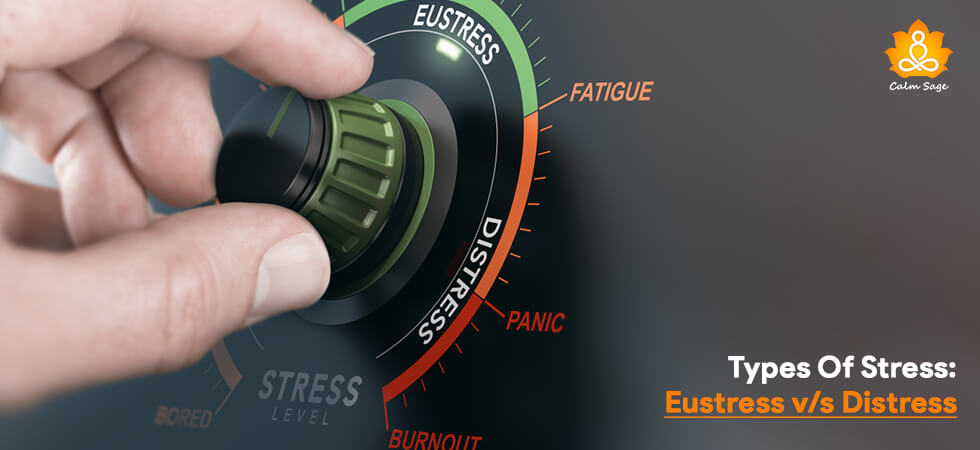Types Of Stress: Eustress v/s Distress

In layman’s understanding stress is often viewed in a negative light. Little did we know that stress also has two sides to it, Eustress and Distress. I am assuming that most of us know about Distress, i.e. negative face of stress, but only a few know about Eustress, i.e. positive face of stress.
Stress can be of an adaptive nature in many situations and knowing that will help us in dealing with all that energy. Basically eustress enhances functionality and distress impairs functionality.
Let’s understand the difference between Eustress and Distress in detail…
Eustress v/s Distress: Meaning
Eustress is a relatively new concept which describes the positive side of stress. Eustress contributes to a motivating, helpful, positive kind of stress that makes you even more productive and goal driven. Eustress is a kind of stress that is good for you.
Here’s what Eustress can do for you;
- Motivates you to work hard
- Improves performance
- Helps you face challenges
- Helps you reach your goals (short term or long term)
Fun fact: Both Eustress and distress, despite being the opposite of one another, both generate fright and flight response in your brain.
Distress on the other hand is the negative side of stress and is not a new concept at all. We are all aware of what distress is. It is often associated with feeling anxious and overwhelmed in challenging situations. Distress can have both psychological and physiological symptoms like;
- Headache, body ache
- Inattentiveness
- Insomnia
- Tension
- Irritability
- Inability to function
Both eustress and distress differ in their stressors and the way one tends to interpret the stressor. If the trigger seems beyond your control, your feelings are more likely to be converted into distress. But in case the trigger stresses you a bit but you have the confidence to face it, you experience eustress.
Eustress v/s Distress: Signs
Since both Eustress and Distress are capable of generating the fright and flight response, it’s natural that the physical signs of stress are almost the same. The palpitations increase, heavy breathing, trembling, etc. which is almost identical in both eustress and distress.
Having said that, the psychological signs of eustress and distress are poles apart, let’s have a look at them;
| Signs of Eustress | Signs of Distress |
|---|---|
| Productivity | Restlessness |
| High level of motivation | High level of procrastination |
| Concentration increased | Concentration decreased |
| Feelings of excitement | Feelings of fear |
| Stress in control | Overwhelmed by stress |
| Improves functionality | Impairs functionality |
| Filled with confidence | Filled with insecurity |
| Positive outcome | Negative outcome |
Eustress v/s Distress: Impact
By looking at the signs you must have guessed what kind of impact both eustress and distress might have on you and your mental health. Since both are the counterpart out the other the impact is also going to be opposite from one another.
| Impact of Eustress | Impact of Distress |
|---|---|
| Increase in energy | Decrease in sleep |
| Increase in focus | Decrease in energy |
| Increase in self-efficacy | Declining physical health |
| Increase in productivity | Mood swings |
| Increase in resilience | Shifts in appetite |
| Increase in motivation | Decreased mental health |
Eustress v/s Distress: Examples
The major difference between the two is caused by differences in their respective stressors. Here are a few examples of stressors related to Eustress and Distress so that you get a better understanding of both types of stress;
| Stressors of Eustress: Examples | Stressors of Distress: Examples |
|---|---|
| Socializing | Deadlines at work |
| Exercising | Crisis (financial, physical or mental) |
| Building relationships | Grief |
| Listening to energizing music | Issues in relationships |
| Adventure sports | Emotional neglect |
| Achievement motivation | Work related challenges |
| Going on a holiday | Abuse (mental or physical) |
Ways To Promote Eustress And Prevent Distress
Well there are various ways you can prevent distress and by the virtue of their difference by preventing distress you automatically will be promoting eustress. Isn’t that great? Let’s quickly look at some ways to do that before we wrap.
- Focus on the solution
- Identify whether the problem is in your control or not, if not just let it go
- Look for meaning in challenging situations
- Take steps to improve the situation if not prevent
- Go for the root cause and not the surface issue
- Don’t forget to be compassionate towards yourself
- Practice mindfulness
- Use relaxation techniques
- Try EFT tapping to reduce stress
- Ask for help, get professional advice
Well, that’s all for today!
I hope you found this blog helpful. Eustress v/s Distress, isn’t it interesting to know how stress can be good for you too? Do comment and tell us what else do you know about eustress v/s distress that we might have missed!
Thanks for reading.
Take care and stay safe!




















